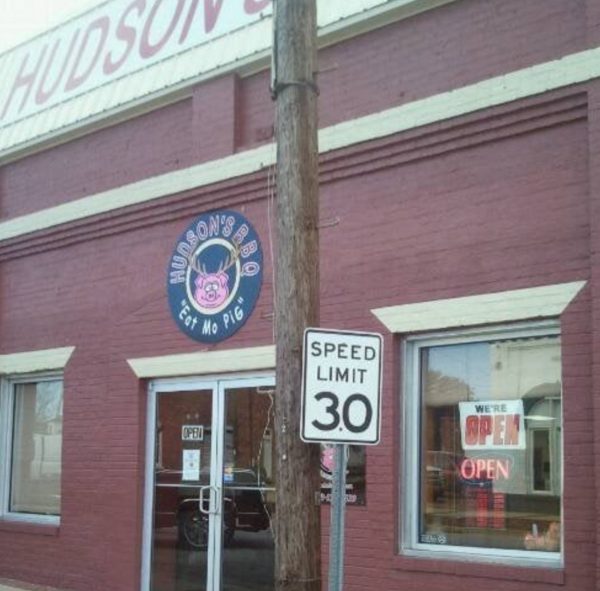With No Grocery Store In His County, A Rural Ga. Restaurant Owner Steps In

Hudson’s BBQ owner Dan Hudson sits near the shelves were he stocks fresh fruits and vegetables.
Courtesy of Dan Hudson
Around Christmas two years ago, the Piggly Wiggly shut down in Crawford County, just west of Macon.
“It’s been tough, man. It’s hard to function,” said Dan Hudson, a longtime resident.
The Piggly Wiggly was the only grocery store in the county, he said.
After it closed, Hudson estimated revenue at the local Dollar General probably quadrupled.
“You could never find a parking spot,” he said. “You have lines going halfway back in the store.”
The Dollar General needed to expand, and people hoped it would start to sell fresh produce, said Hudson, but that didn’t happen.
With the next closest grocery store 30 minutes away, Hudson felt bad for elderly folks who couldn’t make the drive, as well as people with low incomes.
“If you go that far, you want to make it worth your while, and you want to buy a month’s worth of food. Some people can’t afford that all at one time,” he said.
So, Hudson decided to start selling extra produce at the barbecue restaurant he owns.

He gets the fruits and vegetables from a wholesaler and said he sells them for just a little profit.
Lettuce, tomatoes, onions, cucumbers, bell peppers, mushrooms and lemons are some of the fresh produce Hudson offers.
Obesity And Lack Of Access To Fresh Produce
The number of adults in the U.S. who are obese is on the rise, according to data from the Centers for Disease Control and Prevention.
A pair of new studies show obesity is most prevalent in rural areas, even if a higher number of people may be obese in cities.
Increasing access to healthy foods may prevent obesity, according to the CDC.
But it can be especially hard to get fresh fruits and vegetables in rural areas, said Danah Craft, executive director of the Georgia Food Bank Association.
“Yes, there are food deserts in urban areas,” Craft said. “But more transportation options that can help people get where they need to go.”
Craft said many parts of rural Georgia lack a grocery store, and regular access to fresh produce. This can increase health care costs and discourage new businesses from moving in, she said.
Republican leadership in the Georgia Legislature has said addressing problems in rural parts of the state is a priority. Special Senate and House committees have traveled around Georgia to discuss issues like rural broadband, health care and economic development.
During the 2018 legislative session, lawmakers passed a few bills aimed at improving internet and health care access in rural areas, for example.
“I have not seen any kind of work around trying to create incentives for food or grocery stores,” Craft said.
Hudson, the restaurant owner, said he hasn’t thought about how what he’s doing might make the county healthier. But, people have thanked him for the produce.
Business is slow right now, according to Hudson, because a handful of seasonal produce stands are open.
Come fall, however, he expects his grocery business will be back to normal.








